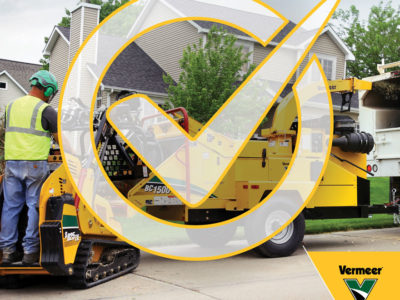Account for operating costs, maintenance history and service availability
Even with the most proactive maintenance and careful, attentive operation, no tree care or landscaping equipment will last forever. Operational tendencies, maintenance preferences and the availability of parts, service and support all contribute to how long a machine will perform on the job. So, how do you know your equipment has reached the end of its operational life?
A lot goes into the decision to retire or trade in a machine, and no two situations are identical, according to Vermeer Environmental Solutions Service Manager Josh Evans. He recommends starting with the guidelines provided in each machine’s operator’s manual.
“It’s a different situation for every business. A lot of us work based on cost of operation, which definitely depends on maintenance history,” Evans said. “We have maintenance intervals for wear items and things like teeth and knives. But, we get service calls for brush chippers and stump cutters from 40 years ago and people are still using them. If you take care of your equipment and maintain it, it can last. We recommend having a conversation with service technicians familiar with your operation and dealer to help make the right choice when it comes to replacing a machine.”
That conversation will help you determine whether it’s time to move forward with new equipment. Evans recommends being proactive with end-of-serviceable-life decisions with tree care and landscape equipment to help manage costs.
“It’s tough to replace something that still runs, but you need to ask if makes sense to keep investing money into a machine as working hours increase. A lot of times, it starts with a conversation with your dealer service technician.”
Consider maintenance history
Even a well-aged machine can have a lot of operational life left in it if it’s been well maintained. The more attentive you’ve been to regular upkeep, the more likely you’ll be able to run a machine beyond its recommended serviceable life. That attention includes everything from replacing knives and teeth to servicing hydraulic and drive systems at the intervals recommended in the machine’s operator’s manuals.
“We see different operating situations every day, and so much depends on how you’ve worked and maintained a machine. Those are two things that drive a lot of end-of-life and replacement decisions,” Evans said.
How proactively a machine like a brush chipper or stump grinder has been maintained over time will also contribute to end-of-service-life decisions. Reactive maintenance — performing upkeep and replacing components only when a broader service issue arises — can contribute to a shorter equipment lifespan, especially as it reaches higher hours of operation. Being more proactive with maintenance often is more cost-efficient in the long run and can prevent the likelihood of a forced end-of-life decision for a tool like a brush chipper or stump cutter.
“In some cases, a machine will be close to the end of its operating life and there may be a catastrophic failure. At that point, it may not be cost-effective to rebuild an engine, for example,” Evans said. “But if you have been more proactive with maintenance and you don’t have a major component or frame failure on your hands, you need to determine whether it’s worth it to invest more into it or replace it altogether. It’s a good conversation to have with your dealer, especially if they are familiar with the machine’s maintenance history.”
Consider the services component
Even if something like a brush chipper outperforms its normal operational life, the ability to perform service — on the jobsite or at the dealership — can sometimes be a major influence in deciding whether to retire and replace the machine. In introducing new components and equipment, a manufacturer takes on added responsibilities for supporting additional machines.
“Commonality in parts and components across multiple machines is huge for our dealers, because it’s more efficient to work on them and find and stock parts,” Evans said.
Make the right call
It can be a tough call to part ways with a brush chipper, stump cutter or other tree care equipment — especially if it’s a machine that’s been a cornerstone of your jobsites for years, and there’s no simple answer to the question of whether or not it’s time to make a change. The decision depends on how many hours you’ve operated the equipment and how you’ve maintained it.
“We know our equipment lasts, and we will stand behind it, but it’s important to know when it’s time to move on to a new machine. We will help with that decision process,” Evans said.
If you’re facing an upcoming decision like this, contact your Vermeer dealer to get on your way to making the right choice.
Vermeer Corporation reserves the right to make changes in engineering, design and specifications; add improvements; or discontinue manufacturing at any time without notice or obligation. Equipment shown is for illustrative purposes only and may display optional accessories or components specific to their global region.
Mini skid steer attachments available from Vermeer dealers may be manufactured by Vermeer Corporation or other attachment manufacturers. Please contact your local Vermeer dealer for more information on machine specificationsand attachments. Vermeer and the Vermeer logo are trademarks of Vermeer Manufacturing Company in the U.S. and/or other countries. © 2020 Vermeer Corporation. All Rights Reserved.
